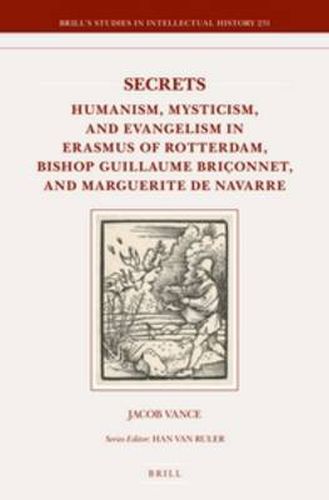Readings Newsletter
Become a Readings Member to make your shopping experience even easier.
Sign in or sign up for free!
You’re not far away from qualifying for FREE standard shipping within Australia
You’ve qualified for FREE standard shipping within Australia
The cart is loading…






In Secrets: Humanism, Mysticism, and Evangelism in Erasmus of Rotterdam, Bishop Guillaume Briconnet, and Marguerite de Navarre, Jacob Vance argues that Erasmus and French Evangelical humanists made secrecy central to their literary thought. They revived Scriptural, medieval, and early Renaissance notions of secrecy in their spiritual and profane literature to advance the reforms in church and society that they advocated.
Erasmus, Briconnet, and Marguerite expanded on Origenian, Augustinian, and pseudo-Dionysian concepts of divine mystery, as being secret, throughout their works. By developing the idea that the divine remains both transcendent and immanent in the world of creation, these humanists explored, through literature, how the human spirit can either accede, or fail to accede, to the secrets of Christian wisdom.
$9.00 standard shipping within Australia
FREE standard shipping within Australia for orders over $100.00
Express & International shipping calculated at checkout
In Secrets: Humanism, Mysticism, and Evangelism in Erasmus of Rotterdam, Bishop Guillaume Briconnet, and Marguerite de Navarre, Jacob Vance argues that Erasmus and French Evangelical humanists made secrecy central to their literary thought. They revived Scriptural, medieval, and early Renaissance notions of secrecy in their spiritual and profane literature to advance the reforms in church and society that they advocated.
Erasmus, Briconnet, and Marguerite expanded on Origenian, Augustinian, and pseudo-Dionysian concepts of divine mystery, as being secret, throughout their works. By developing the idea that the divine remains both transcendent and immanent in the world of creation, these humanists explored, through literature, how the human spirit can either accede, or fail to accede, to the secrets of Christian wisdom.